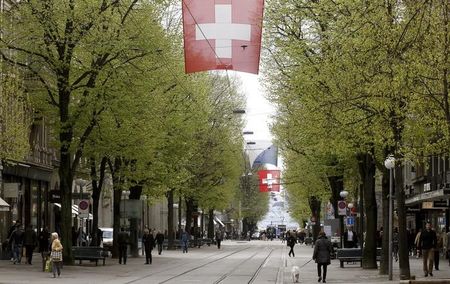ZURICH (Reuters) - The Swiss government cut its growth forecasts for this year and next for the second time on Thursday, highlighting the impact of a rapidly deteriorating economic outlook in its neighbour and main trading partner Germany.
Switzerland's economy struggled in the second quarter as trade activity took a hit from the slowdown in Europe and falling construction spending, and on Wednesday a survey of Swiss investors showed economic expectations slumped in October.
The State Secretariat for Economics (SECO) said it was cutting its growth forecasts, to 1.8 percent from 2.0 percent for 2014 and to 2.4 percent from 2.6 percent for 2015.
"In light of the dampened short-term economic outlook for the euro region, including Germany, the conditions deteriorated compared to the last forecasts in June," SECO economists said in a statement, adding that downside risks had increased.
Switzerland has been able to shield its economy from the euro zone's troubles somewhat, in part by capping the franc at 1.20 per euro in September 2011, after investors bid the safe-haven currency up to record levels.
But recent gloomy data from Germany is particularly worrying because Europe's biggest economy is also Switzerland's largest export market by far.
The Berlin government slashed its GDP forecasts for this year and next on Tuesday, blaming crises abroad and moderate global growth, and a closely watched German economic sentiment index registered its first negative reading since 2012.
"There is considerable pessimism surrounding the German economy, and a technical recession there in the third quarter cannot be ruled out," Zuercher Kantonalbank senior economist Cornelia Luchsinger said.
"This weakness in the euro zone will weigh on infrastructure investments and private consumption in Switzerland."
SLOWDOWN AHEAD
The Swiss National Bank trimmed its growth forecasts through to 2016 last month, saying the economic outlook had worsened and warning of a renewed risk of deflation.
Many economists had also already lowered their predictions for this year, and Zuercher Kantonalbank said on Thursday its 2015 forecast for 2 percent growth was under review.
Switzerland's economy initially showed zero growth in the second quarter, though this was later revised to growth of 0.2 percent after the SECO adopted a new calculation method.
The euro zone economy is also stagnating and, in an effort to prop it up, the European Central Bank has in recent months cut interest rates to record lows and announced new long-term loans for banks and plans to buy private sector assets.
That ultra-loose policy has put renewed pressure on the 1.20 cap that the Swiss National Bank adopted for the franc to stave off deflation and a recession.
SECO forecast on Thursday that Swiss consumer prices would rise by 0.1 percent this year, and saw inflation of 0.4 percent next year, both unchanged from its June forecasts.

Swiss CPI fell from a year ago for the first time in seven months in September, data showed on Tuesday, dragged down by a drop in import cost and tumbling oil prices.
(Reporting by Katharina Bart and Alice Baghdjian, editing by John Stonestreet)
